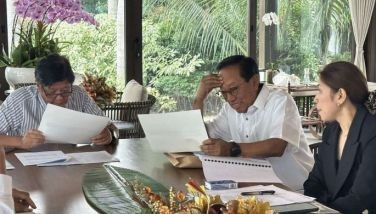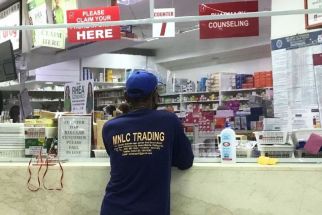Unesco head arriving in RP
April 30, 2002 | 12:00am
Director General Koichiro Matsuura of the United Nations Educational, Scientific and Cultural Organization (UNESCO) is arriving in Manila tomorrow for the May 2 celebration of World Press Freedom Day whose theme this year highlights the new threats to press freedom arising from the war on terrorism.
To mark this occasion, Matsuura will confer on Zimbabwean journalist Geoffrey Nyarota, editor-in-chief of Zimbabwe’s only independent daily newspaper, The Daily News, the Unesco/Guillermo Cano World Press Freedom Prize for 2002. The ceremony will be held at Malacañang, with President Arroyo as guest of honor.
The President and the Unesco director-general will also present a plaque honoring the memory of Wall Street Journal reporter Daniel Pearl, whose murder in February this year drew attention to the dangers faced by investigative reporters working on international terrorism.
Preceding the Malacañang ceremony is a two-day international conference on the theme of this year’s celebration, "Terrorism and Media," to be held on May 1 and 2 at the Westin Philippine Plaza hotel. Some 50 foreign and 70 Filipino journalists are expected to participate in the conference.
The forum will discuss the impact of terrorism on the media around the world, the events of Sept. 11 and their effect on freedom of information, problems in reporting on terrorism, and the safety of journalists working in conflict situations.
According to Vice President Teofisto Guingona Jr., who also chairs the Unesco National Commission of the Philippines (Unacom), the Philippines was chosen by Unesco as the venue for this year’s celebration in recognition of its being one of the freest and vibrant press in the Asia-Pacific region. Director-General Matsuura can witness this himself during his visit, he said.
The visit of Matsuura on World Press Freedom Day also indicates the confidence of Unesco and its director-general in the country, which holds the promotion and the protection of press freedom as one of the core values of democracy, according to Dr. Preciosa S. Soliven, Unacom secretary general.
Koichiro Matsuura, a Japanese, who was elected in 1999 for a six-year term as director-general, has launched reforms to improve the administrative and program aspects of the organization.
He introduced the decentralization of the Unesco field network, whereby a cluster office serves a number of member-states through a multidisciplinary team responsible for implementing Unesco’s activities in the countries covered by the cluster office. (The Jakarta cluster office covers Indonesia, Malaysia and the Philippines.) At present Unesco has 73 field offices throughout the world.
For true universality in Unesco’s membership (at present it has 188 member states), Matsuura has been exerting much effort to bring back the US to the fold. The US, together with Singapore, withdrew from Unesco in the mid-’80s.
For a number of years Unesco, deviating from its mission to provide education and promote human rights, had been used as a forum to rally Third World and socialist-bloc countries against Western industrialized nations.
Under his leadership, Matsuura has redirected Unesco’s focus on basic education with the adoption of the Dakar Framework for Action at the World Education Forum held in Dakar, Senegal in April 2000. It has also taken up new activities like the safeguarding of cultural identity and diversity, and those concerning the relationship between science and ethics.
At its 31st General Conference, Unesco adopted a slew of significant resolutions on the protection of underwater cultural heritage, the respect for and preservation of cultural diversity and the safeguarding of intangible cultural heritage.
At that general conference, it was Philippine Ambassador to France and Permanent Delegate to Unesco Hector K. Villarroel who chaired the culture commission which allowed approval of the resolution adopting the Convention on the Protection of the Underwater Cultural Heritage.
Matsuura believes that Unesco has an important role to play in addressing intolerance, discrimination, inequality, ignorance, poverty and disrespect for cultural diversity, which are breeding grounds for terrorism.
Unesco holds World Press Freedom Day events in various countries and regions of the world, particularly those facing conflicts and threats of terrorism.
Unesco National Commission is spearheading the preparation for this year’s celebration with Vice President Guingona as overall chairman; Unacom vice chair Lisa Macuja-Elizalde, co-chair; Dr. Preciosa S. Soliven, Unacom secretary general, and Dr. Florangel Rosario-Braid of the Asian Institute of Journalism and Communication, as vice chairpersons.
To mark this occasion, Matsuura will confer on Zimbabwean journalist Geoffrey Nyarota, editor-in-chief of Zimbabwe’s only independent daily newspaper, The Daily News, the Unesco/Guillermo Cano World Press Freedom Prize for 2002. The ceremony will be held at Malacañang, with President Arroyo as guest of honor.
The President and the Unesco director-general will also present a plaque honoring the memory of Wall Street Journal reporter Daniel Pearl, whose murder in February this year drew attention to the dangers faced by investigative reporters working on international terrorism.
Preceding the Malacañang ceremony is a two-day international conference on the theme of this year’s celebration, "Terrorism and Media," to be held on May 1 and 2 at the Westin Philippine Plaza hotel. Some 50 foreign and 70 Filipino journalists are expected to participate in the conference.
The forum will discuss the impact of terrorism on the media around the world, the events of Sept. 11 and their effect on freedom of information, problems in reporting on terrorism, and the safety of journalists working in conflict situations.
According to Vice President Teofisto Guingona Jr., who also chairs the Unesco National Commission of the Philippines (Unacom), the Philippines was chosen by Unesco as the venue for this year’s celebration in recognition of its being one of the freest and vibrant press in the Asia-Pacific region. Director-General Matsuura can witness this himself during his visit, he said.
The visit of Matsuura on World Press Freedom Day also indicates the confidence of Unesco and its director-general in the country, which holds the promotion and the protection of press freedom as one of the core values of democracy, according to Dr. Preciosa S. Soliven, Unacom secretary general.
Koichiro Matsuura, a Japanese, who was elected in 1999 for a six-year term as director-general, has launched reforms to improve the administrative and program aspects of the organization.
He introduced the decentralization of the Unesco field network, whereby a cluster office serves a number of member-states through a multidisciplinary team responsible for implementing Unesco’s activities in the countries covered by the cluster office. (The Jakarta cluster office covers Indonesia, Malaysia and the Philippines.) At present Unesco has 73 field offices throughout the world.
For true universality in Unesco’s membership (at present it has 188 member states), Matsuura has been exerting much effort to bring back the US to the fold. The US, together with Singapore, withdrew from Unesco in the mid-’80s.
For a number of years Unesco, deviating from its mission to provide education and promote human rights, had been used as a forum to rally Third World and socialist-bloc countries against Western industrialized nations.
Under his leadership, Matsuura has redirected Unesco’s focus on basic education with the adoption of the Dakar Framework for Action at the World Education Forum held in Dakar, Senegal in April 2000. It has also taken up new activities like the safeguarding of cultural identity and diversity, and those concerning the relationship between science and ethics.
At its 31st General Conference, Unesco adopted a slew of significant resolutions on the protection of underwater cultural heritage, the respect for and preservation of cultural diversity and the safeguarding of intangible cultural heritage.
At that general conference, it was Philippine Ambassador to France and Permanent Delegate to Unesco Hector K. Villarroel who chaired the culture commission which allowed approval of the resolution adopting the Convention on the Protection of the Underwater Cultural Heritage.
Matsuura believes that Unesco has an important role to play in addressing intolerance, discrimination, inequality, ignorance, poverty and disrespect for cultural diversity, which are breeding grounds for terrorism.
Unesco holds World Press Freedom Day events in various countries and regions of the world, particularly those facing conflicts and threats of terrorism.
Unesco National Commission is spearheading the preparation for this year’s celebration with Vice President Guingona as overall chairman; Unacom vice chair Lisa Macuja-Elizalde, co-chair; Dr. Preciosa S. Soliven, Unacom secretary general, and Dr. Florangel Rosario-Braid of the Asian Institute of Journalism and Communication, as vice chairpersons.
BrandSpace Articles
<
>
- Latest
- Trending
Trending
Latest
Trending
Latest
Recommended
































